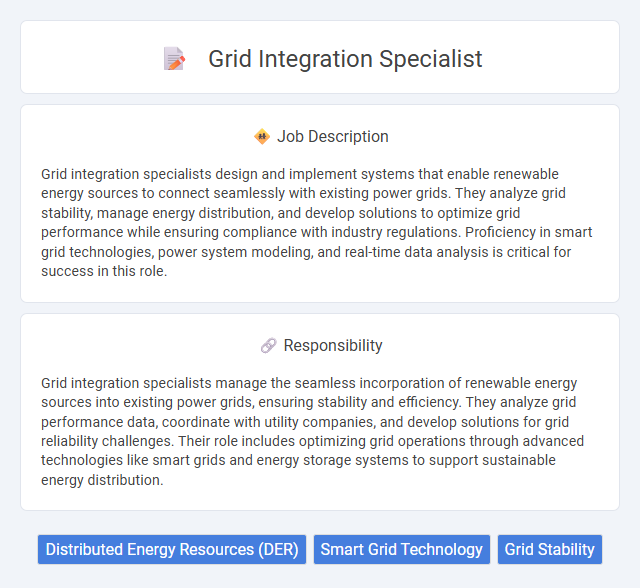
Grid integration specialists design and implement systems that enable renewable energy sources to connect seamlessly with existing power grids. They analyze grid stability, manage energy distribution, and develop solutions to optimize grid performance while ensuring compliance with industry regulations. Proficiency in smart grid technologies, power system modeling, and real-time data analysis is critical for success in this role.
Individuals with strong analytical skills and a background in electrical engineering or renewable energy are likely well-suited for a Grid Integration Specialist role. Those comfortable working with complex data, regulatory standards, and collaborative problem-solving may find this job aligns with their abilities. People who thrive under pressure and can adapt to rapidly changing energy landscapes probably have a higher probability of success in this position.
Qualification
A Grid Integration Specialist requires a strong background in electrical engineering or power systems, with expertise in renewable energy technologies and grid stability analysis. Proficiency in software tools such as SCADA, MATLAB, and PSS(r)E, along with knowledge of grid codes and regulations, is essential for effective system integration. Advanced problem-solving skills and experience in project management further enhance the ability to coordinate complex grid connection projects and optimize energy distribution.
Responsibility
Grid integration specialists manage the seamless incorporation of renewable energy sources into existing power grids, ensuring stability and efficiency. They analyze grid performance data, coordinate with utility companies, and develop solutions for grid reliability challenges. Their role includes optimizing grid operations through advanced technologies like smart grids and energy storage systems to support sustainable energy distribution.
Benefit
Grid integration specialists likely enhance the reliability and efficiency of power systems by ensuring seamless integration of renewable energy sources. Their expertise in managing complex grid operations probably reduces energy disruptions and supports sustainable energy expansion. Employers may benefit from improved system resilience and compliance with regulatory standards through their specialized skills.
Challenge
Grid integration specialists probably face complex technical challenges related to balancing renewable energy sources with existing power grids. Managing real-time data and ensuring system stability likely requires advanced problem-solving skills and continuous adaptation to evolving technologies. Their role might also involve addressing regulatory compliance and coordinating with multiple stakeholders to optimize grid performance.
Career Advancement
A Grid Integration Specialist plays a critical role in ensuring seamless connectivity and stability of power systems by integrating renewable and traditional energy sources into the electrical grid. Career advancement in this field often leads to senior engineering roles, project management positions, or specialized consultancy services, leveraging expertise in smart grid technologies and regulatory compliance. Continuous learning in emerging energy storage solutions and grid modernization enhances prospects for leadership and strategic influence within utility companies or energy providers.
Key Terms
Distributed Energy Resources (DER)
A Grid Integration Specialist in Distributed Energy Resources (DER) is responsible for ensuring seamless incorporation of renewable energy sources into the electrical grid. This role involves designing control systems, managing grid stability, and optimizing the performance of DER technologies such as solar panels, wind turbines, and energy storage systems. Proficiency in smart grid technologies, power system analysis, and regulatory compliance is essential for maximizing DER efficiency and reliability.
Smart Grid Technology
Grid integration specialists in Smart Grid Technology design and implement advanced systems that enhance the efficiency and reliability of power distribution networks. They analyze data from distributed energy resources, such as solar panels and energy storage, to optimize grid performance and facilitate real-time demand response. Expertise in communication protocols, grid automation, and renewable energy integration is essential for ensuring seamless interoperability across smart grid components.
Grid Stability
A Grid Integration Specialist ensures grid stability by managing the seamless incorporation of renewable energy sources into the power network, optimizing load balancing and minimizing fluctuations. They analyze grid performance data and deploy advanced control systems to prevent outages and maintain continuous power quality. Expertise in smart grid technology and energy storage solutions is crucial for enhancing grid resilience and reliability.
 kuljobs.com
kuljobs.com